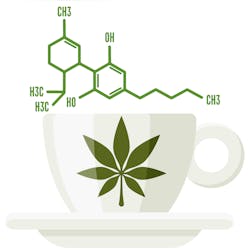Cannabidiol, commonly known simply as CBD, is all the rage. It is being included in everything from supplements to single-serve coffee and tea. There are even plans to create CBD sparkling water and shots. The Specialty Food Association’s Trendspotter panel ranked CBD-rich foods among the top 10 food trends for 2019. With all the hype, are CBD products something office coffee service operators should carry and offer in break rooms?
What CBD does
According to sources promoting CBD, it helps with a variety of health aliments. Project CBD calls it “a cannabis compound that has significant medical benefits, but does not make people feel ‘stoned.’” Healthline claims CBD can relieve pain, reduce anxiety, lessen cancer symptoms and may help protect the heart and neuropathways.
CBD is usually an oil made from the flowers and buds of the marijuana plant, according to WebMD. CBD lacks the chemical tetrahydrocannabinol (THC), which is the psychoactive element most people associate with smoking or ingesting marijuana. CBD is therefore a more appealing alternative for medical treatments as it does not have a mind-altering effect. The downside is it isn’t regulated and hasn’t been sufficiently researched to be declared safe or effective.
Regulated & researched
The U.S. Food and Drug Administration (FDA) ensures edible products are safe for human consumption. This includes food, medication and dietary supplements. The processing requirements and research for the FDA to approve a medical drug are very strict. According to the FDA, CBD has not yet met the drug-approval requirements (although there is one exception related to epilepsy). Because of the lack of research, many CBD sellers call it a supplement, which is not as strictly regulated. However, the FDA considers CBD a new drug under investigation rather than a dietary supplement, making it illegal to sell and ingest.
While there is a growing group who ignores the FDA as the final authority on this type of issue, operators want to carefully consider aligning themselves with the FDA in order to avoid being held accountable for results of any “drug” that has not been approved on the basis of scientific data and information demonstrating that the drug is safe and effective.
Drug testing uncertainty
While CBD is marketed as having little to no THC, its processing isn’t regulated by the FDA, and therefore there is no agency holding processors accountable for consistent and THC-free CBD. THC present in a CBD-enriched product or oil could affect an employee’s work performance and also make an employee test positive during a drug screening.
The Society for Human Resource Management mentions in “The ABCs of THC: What Employers Need to Know About Marijuana Laws” that in states where medical marijuana is legal, workers might have some protections from being fired for testing positive to a drug screening if certain criteria are met, such as being a registered medicinal user. However, no employer has to accommodate CBD (or any marijuana) use on the job.
Health departments ban CBD
Recent crackdowns on cafes and coffee houses provide further support that operators should avoid CBD products if they want to avoid shutdowns and lost inventory. In New York City, health inspectors seized thousands of dollars’ worth of CBD-infused edibles and warned restaurants to stop selling these products, according to NBC NYC.
The LA Times carried similar stories of health departments banning the dispensing of CBD-enriched food and drinks in California. This is especially interesting as recreational and medical marijuana is legal within that state.
While operators should carry the products employees want to buy, CBD-enriched products should be an exception. Until the FDA gives the legal green light to CBD as a food additive, operators should avoid the liability risk.
About the Author

Emily Refermat
Emily Refermat began covering the vending industry in 2006 and served as editor of Automatic Merchandiser from 2012 to 2019. To reach the current editor of Automatic Merchandiser and VendingMarketWatch.com, email [email protected].
